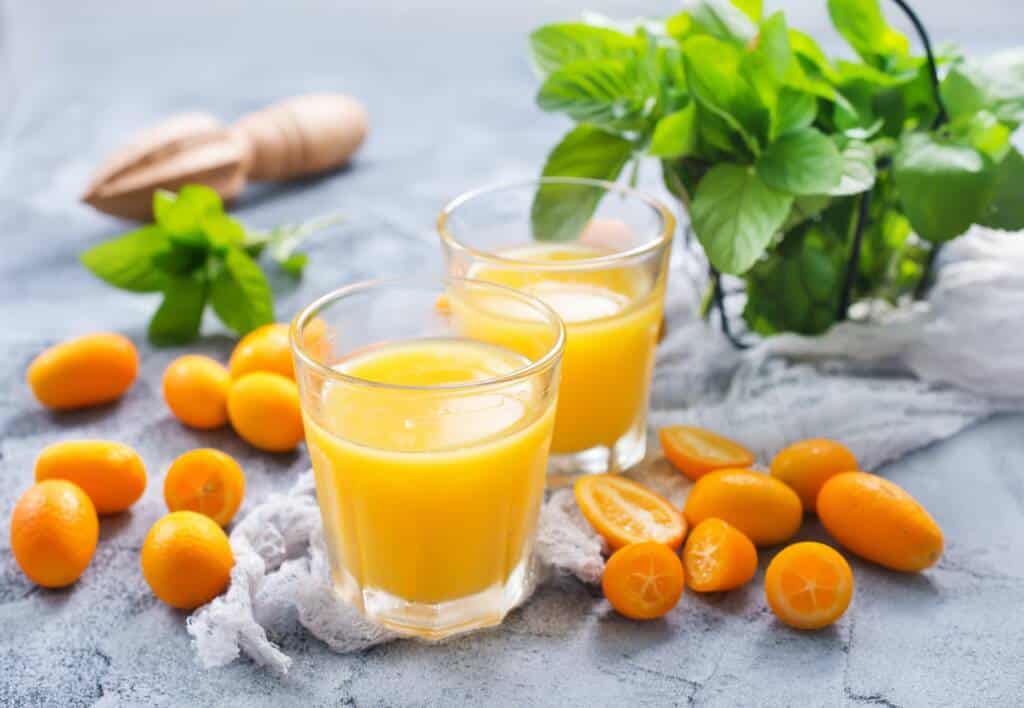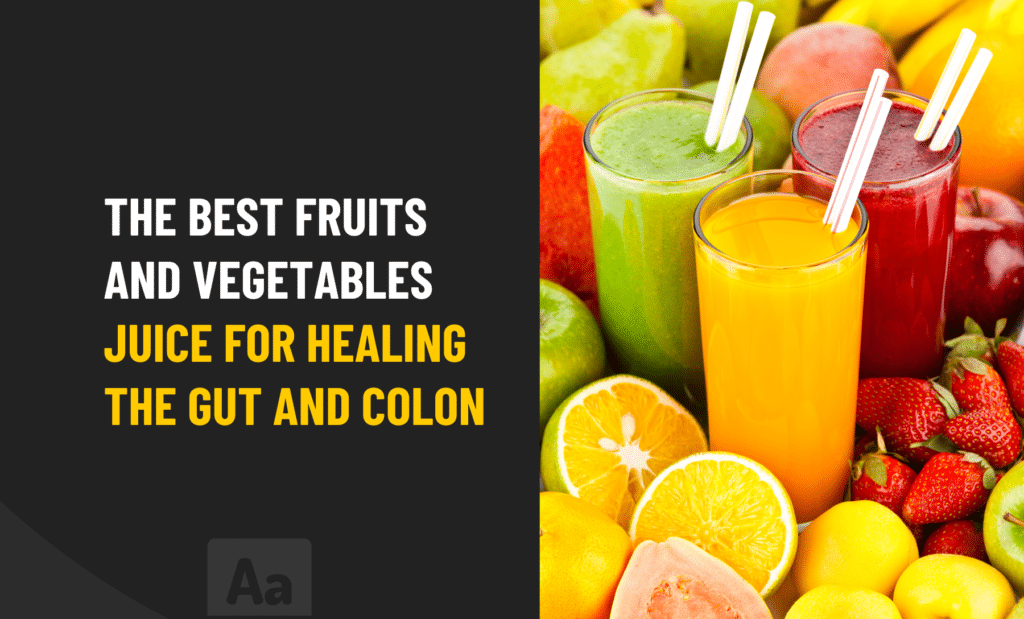
Juicing is the process of extracting the liquids from fresh fruits and vegetables to obtain a concentrated source of nutrients and vitamins.
Different types of juicers can help in the juicing process.
- A centrifugal juicer uses a high-speed spinning metal blade to extract the juice from fruits and vegetables.
- A masticating juicer crushes and presses fruits and vegetables to extract the juice using a slow-turning auger.
- A triturating juicer uses a dual-ger system to extract juice by crushing and pressing the fruits and vegetables.
- Finally, a citrus juicer is specifically designed to extract juice from fruits such as limes, lemons and oranges. They are often manually operated.
All juicers have the same function; to remove the solid parts of fruits and vegetables.
The Advantages Of Juicing For Colon And Gut Health
By juicing, you can easily and conveniently ensure that your body gets all the nutrients it needs. It enables you to combine various fruits and vegetables to obtain a unique nutrient combination that satisfies your body’s nutritional needs.
Here are a few highly valuable benefits juicing can have for your gut and colon health.
Increased Nutrient Intake
Juicing allows you to extract nutrients from fruits and vegetables and place them in a concentrated form. Drinking this concentrated form of nutrients can increase your overall intake of vitamins, minerals, and antioxidants, supporting gut and colon health. You might get full faster if you procure the same amount of concentrated nutrients by ingesting the whole fruit or vegetable.
Improved Digestion
When you eat a fruit or vegetable the normal way, your body will need to break down the fibre and plant cell walls in the stomach, which can take a long time to digest. The fibres and plant cell walls in fruits and vegetables are broken down during the juicing process, which makes it simpler for your body to digest and absorb their nutrients.
Reduced Inflammation
Many fruits and vegetables, such as ginger and turmeric, are included in many juicing recipes. This is because they are well-known for their anti-inflammatory properties. Including these types of fruits and vegetables in your diet can reduce inflammation in your gut and colon.
How To Juice The Right Way – Tips And Tricks
Source: shutterstock
To get the maximum amount of nutrients out of your fruits and vegetables, it is important to know how to juice correctly. Here are some juicing tips and tricks to help you make the most of your fruits and vegetables.
Choose A Variety Of Fruits And Vegetables
It is important to mix up the type of fruits and vegetables you use in your juices so that your body receives a balanced variety of nutrients. Consider a blend of greens, such as kale or spinach, and various colourful fruits and vegetables, such as carrots, beets, and berries.
Incorporate Healthy Fats
Adding healthy fats, such as avocado or coconut oil, to your juice can help increase its nutrient content and improve the absorption of fat-soluble vitamins. This is yet another way to ensure your body takes in the most nutrients possible from your juices.
Use Your Juicer Correctly
The optimal way to use a juicer is by starting with the fruits and vegetables with the highest water content, such as cucumbers or apples. This will help move other produce through the juicer. You should also be sure to alternate between fruits and vegetables with different textures, as this will help prevent the juicer from clogging up.
Fruits You Should Consider
Photo by Julia Zolotova on Unsplash
You can get all the vitamins and minerals you need for a healthy body by juicing your favourite fruits. Juicing fruits and vegetables is not a one-size-fits-all process. Here are the ten best fruits and vegetables you can use to achieve optimal gut and colon health.
Kale
Kale is one of the important plants when it comes to juicing. It contains antioxidants such as vitamin C, beta-carotene, and quercetin. It is also high in anti-inflammatory compounds and fibre, proven to help improve gut health and prevent constipation.
Spinach
Spinach is another leafy green that is great for juicing. It is high in fibre, antioxidants, and anti-inflammatory compounds such as vitamin C, beta-carotene, and magnesium. These nutrients are proven to help improve digestive health and reduce inflammation in the gut.
Beets
Beets are high in fibre and antioxidants such as betalains. They are important in juicing because they help improve blood flow and liver function, which can be a massive boon to the health and well-being of your gut. Additionally, beets are a good source of folate, which is vital for gut health.
Apples
Apples can help regulate digestion and improve gut health through pectin. This soluble fibre has been proven to help regulate bowel movements and promote healthy digestion.
Ginger
Ginger is known for its anti-inflammatory benefits. Encouraging the production of digestive enzymes can decrease intestinal inflammation and enhance digestion.
Lemon
Lemons are an excellent source of vitamin C and can help the body remove toxins. The high acid content of lemons can improve digestive function by breaking down food in the stomach.
Cucumbers
Cucumbers have a high water content. This high water content not only hydrates the body but also flushes out toxins from the colon, thereby improving the health of your gut.
Parsely
Parsley is high in antioxidants and can help improve kidney function, which can benefit the gut. It also has anti-inflammatory benefits and can help reduce inflammation in the gut.
Celery
Celery is high in water content and fibre, which can help regulate digestion and reduce inflammation in the gut. It also contains antioxidants such as vitamin C and flavonoids.
FAQs
How often should I prepare and drink juice to maximise the benefits for my gut and colon health?
The answer depends on your individual needs and goals. Several factors should be considered when determining how often you should juice, such as the types of fruits and vegetables you use, your lifestyle habits, and any existing medical conditions. Understanding these factors and making smart juicing decisions can ensure you get the most out of your juicing routine for improved gut and colon health.
Are there specific ingredients to avoid when juicing for gut and colon health?
Any fruits and vegetables that contain a high amount of sugar, such as grapes, pineapples, and mangoes, can disrupt the health of your gut and feed harmful bacteria.
How does juicing help improve digestion and absorption of nutrients?
Juicing helps break down the fibres in fruits and vegetables, making it easier for your body to absorb the nutrients more quickly. This can help improve digestion and absorption of nutrients, allowing you to get the maximum benefit from your food. Additionally, juicing can increase the number of antioxidants in your diet, which can help protect against disease and promote overall health.





